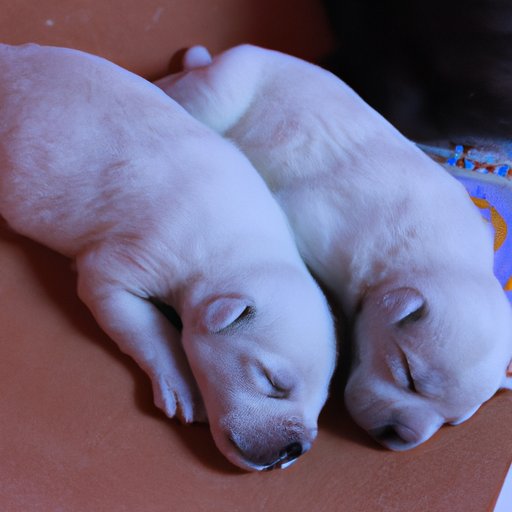Introduction
Are you worried about your puppy’s breathing while they are asleep? You may have noticed that your pup breathes faster than usual when they are sleeping, and this can be concerning for many pet owners. In this article, we will explore the issue of puppy breathing during sleep, and provide some tips for monitoring your puppy’s sleep habits.
Examining the Respiratory Patterns of Sleeping Puppies
How dogs sleep is an interesting topic, as it often varies from breed to breed. Generally speaking, puppies tend to sleep more deeply than adult dogs, and this can cause them to breathe faster. Let’s take a closer look at what causes rapid breathing in puppies while sleeping, and if it is normal behavior.
How Dogs Sleep: The Science Behind Puppy Breathing
Dogs usually experience two types of sleep: REM (rapid eye movement) sleep and non-REM sleep. During REM sleep, puppies experience intense dreaming and their breathing rate increases significantly. This is because their brain is working hard to process the dream images and sensory input. On the other hand, during non-REM sleep, puppies experience deeper sleep and their breathing rate decreases. So, when puppies are sleeping, their breathing rate may fluctuate depending on the type of sleep they are experiencing.
What Causes Rapid Breathing in Puppies While Sleeping?
There are several possible causes of rapid breathing in puppies while sleeping. One of the most common is overheating. If your puppy is too hot, their body will try to cool itself down by panting or rapid breathing. Another possible cause is stress or anxiety. If your puppy is feeling anxious or scared, they may begin to breathe rapidly in order to cope with their emotions. Finally, illness or injury can also cause rapid breathing in puppies while sleeping.
Is It Normal for Puppies to Breathe Fast When Sleeping?
In general, it is normal for puppies to breathe fast while sleeping. However, it is important to monitor your puppy’s sleep habits to make sure they are getting enough restful sleep. Here are some tips for understanding your puppy’s sleep habits and helping them receive quality restful sleep.
A Guide to Understanding Your Puppy’s Sleep Habits
The first step in understanding your puppy’s sleep habits is to pay attention to their breathing rate while they are sleeping. If your puppy is breathing rapidly or panting heavily, this could be a sign that something is wrong. You should also look out for signs of restlessness or sleeplessness, such as tossing and turning, excessive barking, or pacing. Any of these behaviors could indicate that your puppy is not getting enough restful sleep.
How to Monitor Your Puppy’s Sleep Patterns
If you are concerned about your puppy’s sleep patterns, you can use a sleep tracker to help you monitor their sleeping habits. Many pet stores sell sleep trackers specifically designed for puppies, which can help you keep tabs on your pup’s sleeping patterns. Additionally, you can use a motion sensor camera to observe your puppy’s sleep habits over time.
How to Help Your Puppy Receive Quality Restful Sleep
Finally, there are several things you can do to help ensure your puppy gets enough restful sleep. First, make sure their sleeping area is comfortable and free from distractions. Second, provide plenty of exercise throughout the day so that your puppy is tired when it’s time for bed. Finally, create a consistent bedtime routine that includes cuddling and playing before lights out.
Conclusion
In conclusion, it is normal for puppies to breathe fast while sleeping. However, it is important to monitor your puppy’s sleep habits and make sure they are receiving quality restful sleep. By paying attention to your puppy’s breathing rate, using a sleep tracker, and creating a consistent bedtime routine, you can help ensure that your puppy is getting the restful sleep they need.


